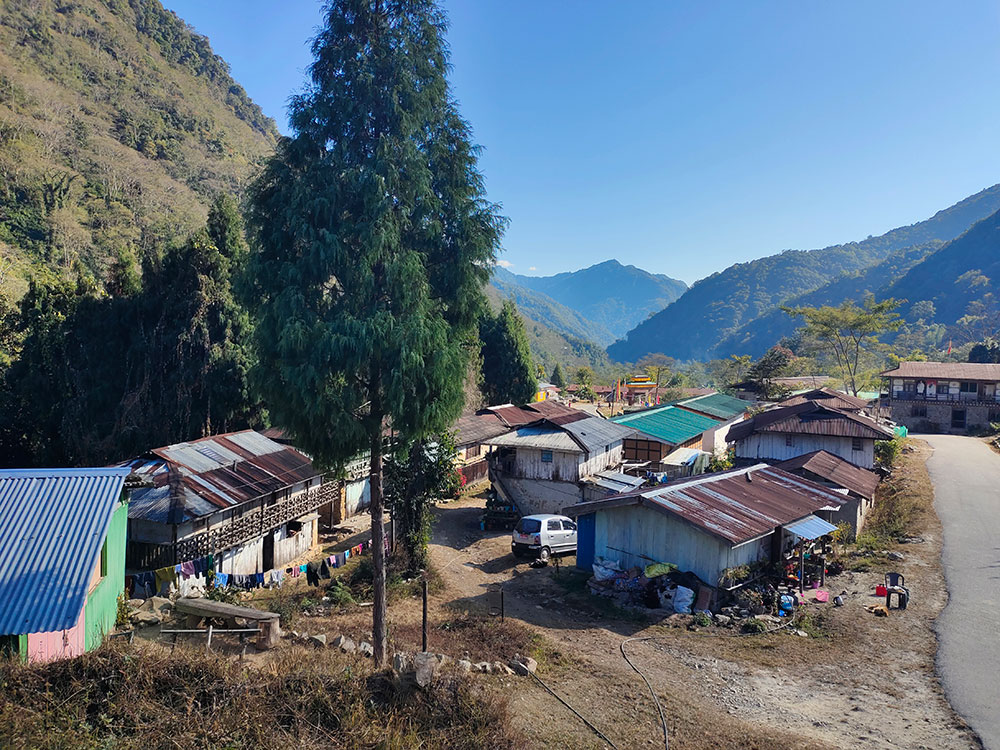Lhakpa Quendren
Sarpang —Business owners and landlords in Jangchubling town under Chhudzom gewog, Sarpang, are faced with uncertainty as their structures have been established on land registered under community ownership.
The registration of 1.43 acres of community land near the gewog centre does not specify whether the land belongs to the gewog administration or any specific chiwogs within the gewog.
There are 18 structures for restaurants, hardware stores, grocery shops, tailor shops, and even a hotel.
While many of these structures are temporary, there are families that have constructed permanent structures on the disputed land.
Nar Maya Rai, a 47-year-old landlord, said that the gewog administration informed them to dismantle their structures about three months ago. “There were also talks about a plan for proper town development, which will be rented out for businesses, but nothing has been coming up.”
A 42-year-old restaurateur, Sharmila Rai, said that she established the structure due to the favourable location of the business. “I have been here for the last eight years, and since most of the chiwogs require travel of over 15 kilometers, people come here for shopping and meetings at the gewog.”
The gewog administration, about four months ago, suspended rental collections while efforts continue to resolve this issue. The 11 landlords who have rented their spaces have been collecting rents from the business operators for about four decades.
Ganga Prasad Subba, a 34-year-old shopkeeper, said that he had been paying a monthly rent of Nu 1,000. “I have been doing business here since 2014. I earn about Nu 1,500 to Nu 2,000 a day.”
“It would be a great help if town development is initiated. I opened my shop in the former FCB shop,” Sher Maya Ghalley said, adding that rent has not been collected for about a year.
According to the gewog official, the land ownership is complex as it is registered under the community, and the land type is an institution. “If we go through the land act, there is no clear-cut. So we could not move forward.”
The official said that the gewog administration has been paying the land tax since 2012. “We also met with the business community and landlords. Over the past 38 years, they have collected rents, which would have covered their expenditures.”
“We also proposed to the business operators the idea of opening a community bank account for rent collection. In this way, there can be cost-sharing between the gewog administration and the business community for any development,” he said.
The explored options include either dismantling the structures, as agreed upon by the business community, reconstruction, maintenance, or land lease. However, a question arises whether those existing landlords can avail of the opportunities.
“We have also discussed this with the Sarpang dzongkhag administration and were advised that opportunities would be given to those who operate the business, not to those who built the structures,” said the official. “The issue was even discussed during the Dzongkhag Tshogdu.”
The illegal temporary sheds were initially established at Galeythang for a Thursday market in 1975 and were later moved to Jangchubling in late 1980s after a flood affected the sheds sometime in 1986.
Following that, the gewog administration then provided the affected business operators the same space to resume their business. However, they have constructed structures on the land and subsequently rented them out to others.
Most of the beneficiaries are from Jangchubling, Dragchhu, and Sherubling chiwogs. The town was electrified in 2017 after being verified as community land, initially designated as State land.


